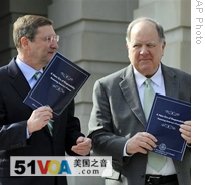Washington
26 February 2009
 |
| US Senate Budget Committee Chairman Kent Conrad (left) and House Budget Committee Chairman John Spratt hold copies of budget |
As lawmakers assess the budget, the rhetoric about spending and saving projections and priorities heated up.
Democrats face a heavy lift in implementing the agenda proposed in the president's 140-page outline, which is a precursor of the full budget the president will send Congress in April.
House of Representatives Speaker Nancy Pelosi says the budget outline shows President Obama is keeping to his pledges of fiscal responsibility.
"The budget is consistent with the president's message of accountability, fiscal responsibility, transparency from the standpoint of how we approach of it. It reflects the values that he conveyed about investing in education and energy and health care, also in how we grow our economy [with] infrastructure and how we support our troops," she said.
A key part of the budget involves health care, with $634 billion proposed over 10 years drawn from tax increases on the wealthy and medical system savings to expand coverage for Americans.
Republicans say President Obama's plan to raise taxes for families earning more than $250,000 a year would harm small businesses, eliminate jobs, deepen the recession and the national debt.
"It's a spend, tax and borrow our way to prosperity budget. It proposes bigger government with higher spending, higher taxes, and higher debt as a means to produce prosperity in America," said Republican Congressman Paul Ryan.
House Minority Leader John Boehner said "there has been too much spending under Republicans over the last several years. But if you begin to look at what has happened over the last month and what is being proposed in this budget, the president is beginning to make [former] President Bush look like a piker when it comes to spending."
Senator Judd Gregg, the ranking Republican on the Senate Budget Committee, said there are some good technical aspects to the budget, but he assailed proposed tax increases and spending.
"There are massive tax increases in this bill, in this proposal, $1.4 trillion by our calculation. That's a big number. [There is] massive spending in this bill just in the health care area [and] approximately $1.4 trillion of new spending," he said.
But President Obama's budget director, Peter Orszag, says Republicans are just wrong in their assertions about the president's tax proposals.
"The assertion that we are raising taxes in the midst of a recession is just factually wrong. And, in fact, we just cut taxes as part of the [American] Recovery [and Reinvestment] Act which his exactly what is appropriate from a macroeconomic perspective to boost aggregate demand during a downturn," he said.
House Budget Committee Chairman John Spratt says compared to the eight years of the Bush administration, President Obama is directly confronting economic problems.
"President Obama, to his credit, has responded with a budget which shows he is not flinching or stalling, but is meeting the challenge head on," he said.
As they look at legislative action this year to reform health care, Democrats are also assessing how to move forward with long-postponed steps to reform costly government entitlement programs such as social security, as well as the tax system itself.
"To pursue not only reform of the entitlements but reform of the revenue system. There is just too much leakage in the system, and beyond that it does not position us well to compete in a globalized world economy," said Democratic Senator Kent Conrad, who heads the Senate Budget Committee.
Congress is not bound to a president's budget proposals, and this is the first step in a process leading to approval of a budget resolution that sets broad spending, tax and economic goals.
Congressional committees begin hearings on President Obama's budget next week. Between now and October 1 when the 2010 fiscal year begins, lawmakers will also work on the regular appropriations bills to fund government operations.